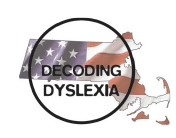Our Mission
Decoding Dyslexia – MA is a grassroots movement driven by parents, educators and
professionals concerned with the limited access to research based interventions for dyslexia.
We are inspired by and collaborating with other Decoding Dyslexia groups nationwide.
We aim to raise awareness, to empower students with dyslexia and their families, and
to inform policy makers on best practices to identify, remediate, and support students with
dyslexia in Massachusetts public schools and institutions of higher learning.
professionals concerned with the limited access to research based interventions for dyslexia.
We are inspired by and collaborating with other Decoding Dyslexia groups nationwide.
We aim to raise awareness, to empower students with dyslexia and their families, and
to inform policy makers on best practices to identify, remediate, and support students with
dyslexia in Massachusetts public schools and institutions of higher learning.
|
Decoding Dyslexia Massachusetts DD-MA was founded and organized by a team of interested parents and professionals, three of whom are currently still actively managing the business of the group, Nancy Duggan, Nicole Mitsakis and Lisa Nelson. Decoding Dyslexia Massachusetts, Decoding Dyslexia MA and DD-MA are Trademarked and part of the National Network of Decoding Dyslexia. The Artwork and Logo were designed by Nicole Mitsakis, all rights reserved.
|
Decoding Dyslexia Massachusetts welcomes collaborative and constructive local leaders and participants as events and community needs develop. However the group is official represented by the leadership team.
If you would like to learn more about our leadership team and how to get involved please email: beecustom@verizon.net. Affiliated local groups are authorized through DDMA. |
Empowering with Awareness
- Working to spread research based, evidence based and scientifically accepted information that identifies dyslexia and proven, evidence based interventions and teacher training
- Reaching out to policy makers to inform them of the number of students failing or struggling with dyslexia
- Sharing individual stories covering a broad spectrum of the dyslexic experience in the classroom, in the arts, and in the corporate world
Current Goals
We aim to raise dyslexia awareness, empower families to support their children, inform policy-makers on best practices to identify, remediate, and support students with dyslexia in the Commonwealth of Massachusetts.
1. Legal recognition in the Commonwealth of Massachusetts of a science-based definition of dyslexia, accepted recognized
by neuroscience. This included our advocacy for multiple legislative sessions culminating in passing the Massachusetts Dyslexia Law of October of 2018, our collaboration with DESE for the Dyslexia Guidance Documents, and continues.
Currently, we advocate for more clear and transparent policies and procedures that ensure equal access to age-appropriate and evidenced-based appropriate reading instruction specific to the needs of the child with dyslexia, not delayed or denied by poor core instruction, or delayed or relaced with MTSS interventions without the rights of a special education individualized plan.
2. Early screening for dyslexia. Research shows definitively that dyslexia exists at birth and can be screened for at risk signs before reading instruction validly and economically at age 5. Learn More, each link connects to another article. Though the dyslexia legislation passed in 2018, implementation in each school or district is based on local authorities and policies and should be consistently implemented, but currently, there is a large variation.
3. Evidence-based education and remediation programs for general and special education students who show signs of dyslexia. Not all students with signs of dyslexia will need special education if identified early and intervention is evidence-based for dyslexia these students can learn to read before third grade; closing the "gap" before it begins.
4. Teacher training on dyslexia, its warning signs, best practices, and accommodation strategies that help students with dyslexia.
5. Raise parent and student awareness of dyslexia, the challenges it presents and very real possibility of success with proper intervention.
1. Legal recognition in the Commonwealth of Massachusetts of a science-based definition of dyslexia, accepted recognized
by neuroscience. This included our advocacy for multiple legislative sessions culminating in passing the Massachusetts Dyslexia Law of October of 2018, our collaboration with DESE for the Dyslexia Guidance Documents, and continues.
Currently, we advocate for more clear and transparent policies and procedures that ensure equal access to age-appropriate and evidenced-based appropriate reading instruction specific to the needs of the child with dyslexia, not delayed or denied by poor core instruction, or delayed or relaced with MTSS interventions without the rights of a special education individualized plan.
2. Early screening for dyslexia. Research shows definitively that dyslexia exists at birth and can be screened for at risk signs before reading instruction validly and economically at age 5. Learn More, each link connects to another article. Though the dyslexia legislation passed in 2018, implementation in each school or district is based on local authorities and policies and should be consistently implemented, but currently, there is a large variation.
3. Evidence-based education and remediation programs for general and special education students who show signs of dyslexia. Not all students with signs of dyslexia will need special education if identified early and intervention is evidence-based for dyslexia these students can learn to read before third grade; closing the "gap" before it begins.
4. Teacher training on dyslexia, its warning signs, best practices, and accommodation strategies that help students with dyslexia.
5. Raise parent and student awareness of dyslexia, the challenges it presents and very real possibility of success with proper intervention.
